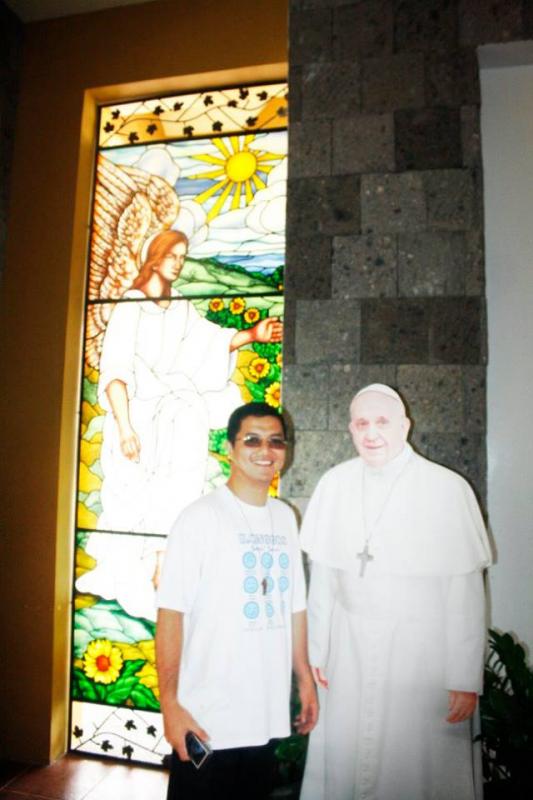A Pop Star Catholic Priest
An edited version of an article that first appeared in LADOC, Peru
 With his front line role in taking religion to the masses in Brazil through the electronic media, Father Marcelo Rossi has been at the center of more than one storm in recent years. While he denies being a ‘pop star’, it is difficult to see him any other way. Newspapers describe him as ‘young, handsome and athletic, selling millions of records, with TV stations vying for his presence.’
With his front line role in taking religion to the masses in Brazil through the electronic media, Father Marcelo Rossi has been at the center of more than one storm in recent years. While he denies being a ‘pop star’, it is difficult to see him any other way. Newspapers describe him as ‘young, handsome and athletic, selling millions of records, with TV stations vying for his presence.’
I never took a communication course and don’t want to create a model (of mass communication). All I want is for the Church I love to grow more each day,’ says the 34-year–old priest, who is based in Santo Amaro Diocese in Sāo Paulo, Brazil’s largest city. More than 80 percent of Brazil’s 160 million people are Catholic. According to Fr Marcelo, as the priest is popularly known, about four percent of all Catholics took part in the charismatic movement in 1997, a figure that quickly grew to 12 percent. He thought it ‘could reach 40 percent’ soon.
Celebrity priest
More than 30,000 people attend Rossi’s Masses in a Sāo Paulo neighborhood, and in just a few weeks his compact disc, Music for Praising the Lord, sold more than 3 million copies, a mark never before reached by artists signed by PolyGram, Rossi’s recording label. His daily program on Radio America, with more than 60 stations, has an audience of 800,000. The Brazilian TV networks, Globo, SBT, Bandeirantes, and CNT, vie for his presence because ratings go up when he appears.
Less political sermons
Rossi is a true phenomenon inside the Brazilian Catholic Church as well. Shunning the more political tradition of Brazil’s clergy, he never addresses social issues in his homilies. He considers homosexuality a sin and condemns abortion, contraceptives and sex outside marriage. ‘The work of priests and religious must be more spiritual than social,’ he says.

Business and evangelization
According to newspaper reports, Rossi owns a company called Byzantine Rosary Ltd, which sells various products at his well-attended liturgies. Although the company is in the names of Rossi and his mother, Bishop Fernando Figueirido of Santo Amaro Diocese has said it is in the service of the church’s social mission in Sāo Paulo. Antonio Kater, author of the book Marketing in the Catholic Church, says, ‘The Santo Amaro Diocese seems like a business. It is well organized and knows how to sell its product: salvation.’
Commercial religion
The apparent close ties between Rossi and Figueirido are reflected in their public statements. The bishop has defended Rossi when the priest has been the subject of debate in the Brazilian Conference of Bishops, and Rossi has said he always consults Figueirido. Theologian Leonardo Boff has been especially critical of Rossi, calling his style ‘commercial religion’. ‘Father Marcelo is happy believing God is in heaven, without realizing that people don’t have bread,’ says Boff, author of 40 books on theology and the Church.
After Pope’s Visit
‘When Pope John Paul II was in Brazil in 1997 and he asked us to think about new ways of spreading religion, I thought the Church needed to take advantage of the media,’ says Rossi. Within two years of the papal visit Rossi’s ministry had grown rapidly from its humble start as a weekly program on a radio station outside Sāo Paulo.
Fit for Leaps
‘Until I was 10, I dreamed of driving a Formula One race car. Then I thought I could become a good soccer player. But the death of a teenage cousin brought me to church and put me on the path of the Lord,’ says Rossi, whose background in physical education was good training for the leaps and gestures that characterize his Masses, which are all accompanied by music.
Too famous to go out
The priest’s life has changed so drastically in such a short time that he needs security guards whenever he appears in public. When he goes to a Mass, he uses three vehicles to throw his followers off track. Since becoming famous, he has tried only once – without success – to go to the corner bakery to buy bread.
Headliner
Rossi has made headlines for various reasons. The national police recently took action to shut down a web page that included offensive remarks about him, and Sāo Paulo officials closed his ‘church’, which is really part of an old factory, for safety reasons.
The city’s Building Department calculated that he would need at least three weeks to make repairs and meet requirements, but the work was done in record time. One hundred parishioners pitched in and the church reopened in less than a week. According to the weekly newspaper Epoca, about 900 volunteers assist the popular priest in various ways.
Rossi has been the target of criticism by evangelicals. The Christian magazine Vinde reported that he had appropriated evangelical songs without the composers’ permission. Although PolyGram worked out arrangements with them, the claims added fuel to accusations by Edir Macedo, leader of Brazil’s huge evangelical Universal Church, that Rossi ‘clones evangelical services and uses clichés that sound religious.’
